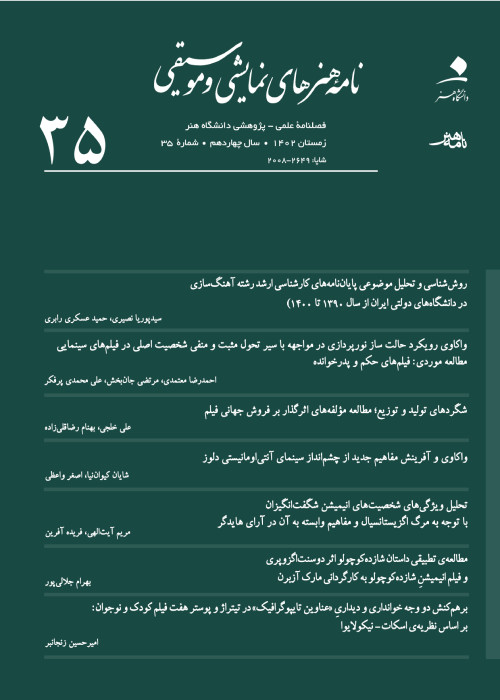A Hermeneutic-Phenomenological Approach to the Cinema
Author(s):
Abstract:
“Phenomenology of film” could be defined in the field of philosophy of film, which itself is a growing subfield of contemporary philosophy of art. According to current essay, it is clear that Hermeneutic- Phenomenology, declaring by Heidegger and expanding by Gadammer, has more possibilities for thinking in contrast to the classic Phenomenology, growing by Husserl and many of his followers. Hermeneutic-Phenomenology in the line of the unity of Heidegger’s thought shows the unity of the relations between man and Being in a resonating way. Attending phenomenology of art in Heidegger reveals proper notions (such as world) which could be used for phenomenologically thinking about the truth of cinema. Gadammer, too, applies Heidegger’s phenomenology of art as a model of understanding, but not exactly going on his way. Some inquiries using phenomenology for film theory such as Allan Casebier, Daniel Yacavone and Malin Wahlbergs attempt to show not enough succeed, because of the problems such as lack of illuminating the cinema in itself, lack of paying attention to the cinematic capacities of other theories, and lack of passing the current subjective way of thought. Criticizing many views about Heidegger and film also shows rare attention to the way in which Heidegger suggests to think, and instead using Heideggerian concepts to define cinema. Some of these views including many philosophical essays about thin, red, line are only attempts to show probable philosophical as well as poetic capacities of cinema and not examining and declaring the way these capacities absolutely may be. While some other writers as Robert Sinner brink pay attention to cinematic technique more and try to clear a Heideggerian point of view according to his opinions about technique, arts, poetics, etc.; he also cannot explain how the cinema has the ability to be poetic, while his interpretation about Heideggerian poesies is awfully wrong. But, followingHermeneutic-Phenomenological way to think about cinema, attending inspirations from Heidegger in concepts such as technology, world, Dasein, world-picture etc. helps to enclose the truth of cinema. This essay comes close to cinema in a hermeneutical manner, to see cinema, movie or film -as what it really is – and not from the viewpoint of its theories. Therefore the authors explicated Heidegger’s main viewpoints about Gestell, Gebild etc. and came close to the truth of it. Although this may not be enough, and the cinema should be interpreted according to its history. Finally, using Gadammers term, game, unfolds cinema as a technological world, sharing by both filmmakers and viewers, considering a determinate culture - a definitive world - for ordinary viewers of movies, who look for entertainment in watching motion pictures. This article does not necessarily deny the probable capacity of movies for representing several thoughts and values - regarding Heidegger’s authentic Dasein or world - after the mentioned conditions.
Keywords:
Language:
Persian
Published:
Journal of dramatic Arts and Music, Volume:2 Issue: 3, 2012
Pages:
47 to 62
magiran.com/p1161220
دانلود و مطالعه متن این مقاله با یکی از روشهای زیر امکان پذیر است:
اشتراک شخصی
با عضویت و پرداخت آنلاین حق اشتراک یکساله به مبلغ 1,390,000ريال میتوانید 70 عنوان مطلب دانلود کنید!
اشتراک سازمانی
به کتابخانه دانشگاه یا محل کار خود پیشنهاد کنید تا اشتراک سازمانی این پایگاه را برای دسترسی نامحدود همه کاربران به متن مطالب تهیه نمایند!
توجه!
- حق عضویت دریافتی صرف حمایت از نشریات عضو و نگهداری، تکمیل و توسعه مگیران میشود.
- پرداخت حق اشتراک و دانلود مقالات اجازه بازنشر آن در سایر رسانههای چاپی و دیجیتال را به کاربر نمیدهد.
دسترسی سراسری کاربران دانشگاه پیام نور!
اعضای هیئت علمی و دانشجویان دانشگاه پیام نور در سراسر کشور، در صورت ثبت نام با ایمیل دانشگاهی، تا پایان فروردین ماه 1403 به مقالات سایت دسترسی خواهند داشت!
In order to view content subscription is required
Personal subscription
Subscribe magiran.com for 70 € euros via PayPal and download 70 articles during a year.
Organization subscription
Please contact us to subscribe your university or library for unlimited access!



